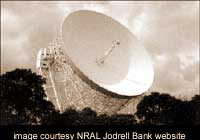Article/Document:
A SETI Dialog
SETI League
original source | fair use notice
Summary: The following questions were posed to SETI League executive director H. Paul Shuch, by Manchester University's Prof. Ian Morison, coordinator of SETI activities at the Nuffield Radio Astronomy Laboratories, Jodrell Bank.
Prof. Morison: Do you believe there is intelligent life in the universe?
Dr. Shuch: That's a fundamental question which has haunted humankind since first we realized that the points of light in the night sky are other suns. What matters most is not what you or I believe, but what we know for certain: that, for the first time in human history, we have the technology to begin to seek a definitive answer. Therefore it behooves us to look, and look well.
Prof. Morison: What do you think your chances are of discovering extra-terrestrial intelligence?
Dr. Shuch: My personal chances of making The Discovery are so low as to approach zero. However, if our assumptions about the abundance of technological life throughout the cosmos are correct, and if our planet dedicates only a minor portion of its resources to The Search, the chances of eventual success become significant. It's not a question of if, only of when.
Prof. Morison: How do you imagine such a discovery would change humankind?
Dr. Shuch: Even though we share our starship with six thousand million fellow travelers, Earth is a lonely place. Perhaps certain knowledge about our cosmic companions would make it a little less lonely.
Prof. Morison: Would any extra-terrestrial civilisation be aware of our presence?
Dr. Shuch: Ours is an environmentally careless civilization. We have surrounded our planet with a sphere of electromagnetic pollution, now extending out to perhaps 50 or 60 LY. That polloution sphere, clearly detectable over interstellar distances, is expanding ever outward at the speed of light. Since the photon is the fastest spaceship known to man, our radio pollution has already marked ours as a planet inhabited by tool-using beings. Unfortunately, it has also marked us as wasteful and inconsiderate. Let us hope we don't come to regret sending out that calling card. On the other hand, SETI is counting on the premise that other civilizations also engage in electromagnetic pollution, at least somewhere along their continuum of technological development.
Prof. Morison: Can you give some idea, in layman's terms, what kind of signals you could possibly detect, for example, how close would ET civilisations have to be in order for us to detect signals like TV transmissions?
Dr. Shuch: The most powerful electromagnetic emissions sent from Earth have probably been our old Cold War search radars. We have the technology right now to detect such signals from planets orbiting nearby stars. But an extra-terrestrial civilization need not be warlike to emit detectable radar signals. We can envision other beings using powerful radar signals to seek out asteroids and comets which might pose a threat to life on their planets. And those signals, too, would be visible to us, if we just know how to search for them.
Prof. Morison: In simple terms, how does your equipment work and what makes it unique?
Dr. Shuch: Most SETI programs, including Project Phoenix, rightly use the world's great radio telescopes (such as the Lovell Telescope at Jodrell Bank) to target individual candidate stars. The SETI League, on the other hand, has adopted a radically different strategy. We are building a global network of thousands of rather small, relatively inexpensive (and admittedly insensitive) amateur radio telescopes, hoping to make up in strength of numbers what we lack in funding.
Prof. Morison: Where are you looking for ET civilisations and why?
Dr. Shuch: Project Phoenix, in which you are involved, is already doing an outstanding job surveying the nearest sun-like stars. The SETI League is conducting an all-sky survey, a technique which we hope will be complementary to the targeted searches. If extra-terrestrial radio signals are incredibly powerful, yet highly intermittent and of brief duration, our strategy stands a chance of success.
Prof. Morison: Why do you believe SETI research is important, to you personally and to humankind in general?
Dr. Shuch: Those of us in SETI today have been given a priceless gift: the technological heritage of those who went before us. To squander such a gift would be unseemly. Newton said he saw further because he stood on the shoulders of giants. SETI stands on the shoulders of ordinary people. If we succeed, we are all giants!
Read more articles on this topic:






